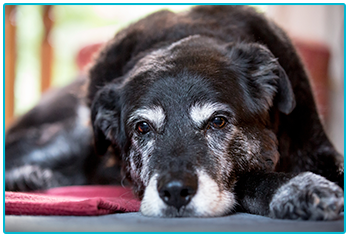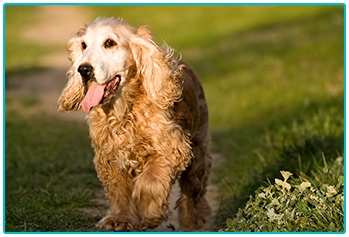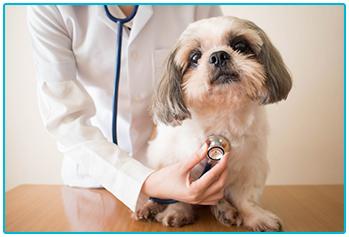Just like people, when dogs grow older, you’re likely to notice them starting to slow down. They may become less active than when they were in their younger days and begin to join you on fewer adventures. Your veteran dog’s needs also change during this time and you might have to alter your home routine to facilitate an elderly pup. That’s why we’ve put together our guide on looking after senior dogs and giving your pup the care they need as they grow old.

R&R
One of the largest changes you might see as your dog ages is the amount of rest they need. Ensure they have easy access to a bed that’s comfortable and soft, preferably in a quieter part of the house to aid with rest and relaxation. Put down rugs in rooms with slippery floors where your pet might find it difficult to stand up or walk. Keep their home routine predictable too, and make sure they have easy access to food and water without competition from younger dogs.
Dietary Changes
As dogs get older, their dietary needs may change, too. You might want to think about changing them to a senior dog food. While these are usually recommended for dogs that are seven years or older, larger dogs tend to reach seniority at an earlier age than smaller dogs. You should consult your vet before changing your pet’s food. Also contact your vet if your dog is eating less, gaining or losing weight, or if incontinence becomes an issue.

Exercise
Older dogs may be a little slower, but many of them still need daily exercise and stimulation! Taking your dogs on shorter yet more frequent walks could give them the exercise they need. Regular exercise can help prevent them from gaining weight and could also keep them sociable with other dogs and people. If your dog seems stiff, however, it might be best to leave them to rest. Contact your vet if you’re unsure.
Hard of Hearing
As they age, some old dogs may develop issues with their hearing or sight. This means they could startle more easily, so try to avoid sudden loud noises. Make sure everyone in the house knows to approach them quietly, gently and slowly too, especially children. If you think that your dog is beginning to ignore you, they may simply not be able to hear you.

Be Observant
As your dog grows older, be aware of issues they might face. If they appear stiff and find it hard to stand up, for example, they may have arthritis. Changes in behaviour can have underlying medical issues, which you might be able to treat or manage to help make their life more comfortable. Don’t just assume their behaviour is changing solely because of old age. If you’re concerned with any of your senior dog’s behavioural changes as they get older, you should contact your vet.
We hope this guide can help you give your aging canine companion the care they need! If you’ve got a veteran dog, you might want to think about taking out insurance for your furry friend. At The Insurance Emporium, our Senior Dog Insurance for pups aged 8 years old and over includes a range of Standard Benefits, such as cover for Vet’s Fees up to £8,000.* We also offer up to 30% discount!^ Head down to The Insurance Emporium to find out more!
* Vet’s Fees cover up to £8,000 available on lunar and calendar monthly Lifetime Gold policies.
^ The 30% discount is made up of 20% Introductory Discount plus 10% Multi-pet Discount (if appropriate). The Introductory Discount is available for the first 12 premium payments on lunar and calendar monthly policies or one premium payment on annual policies.
All content provided on this blog is for informational purposes only. We make no representations as to the accuracy or completeness of any information on this site or found by following any link on this site. We will not be liable for any errors or omissions in this information nor for the availability of this information. We will not be liable for any loss, injury or damage arising from the display or use of this information. This policy is subject to change at any time.


